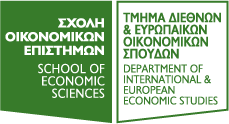Fall Semester 2024-2025
-
Date:12/09/2024 - 15:30 - 17:00

Title: "Biological age and predicting future health care utilisation"
Speaker: Assistant Professor Apostolos Davillas, Department of Economics, University of Macedonia
Host: Assistant Professor Efthymios Athanasiou, Department of Economics, Athens University of Economics and Business
Time: 15.30 -17.00
Room: 76, Patission Str., Derigny Wing, 4th floor, Room D4
Attachments:
 PDF of Relevant Paper
PDF of Relevant PaperAbstact: We explore the role of epigenetic biological age in predicting subsequent health care utilisation. We use longitudinal data from the UK Understanding Society panel, capitalizing on the availability of baseline epigenetic biological age measures along with data on general practitioner (GP) consultations, outpatient (OP) visits, and hospital inpatient (IP) care collected 5-12 years from baseline. Using least absolute shrinkage and selection operator (LASSO) regression analyses and accounting for participants’ pre-existing health conditions, baseline biological underlying health, and socio-economic predictors we find that biological age predicts future GP consultations and IP care, while chronological rather than biological age matters for future OP visits. Post-selection prediction analysis and Shapley-Shorrocks decompositions, comparing our preferred prediction models to models that replace biological age with chronological age, suggest that biological ageing has a stronger role in the models predicting future IP care as opposed to “gatekeeping” GP consultations.
-
Date:19/09/2024 - 15:30 - 17:00
 Title: "Conventional Inference in the Vicinity of Generalised Nonstationarity Boundaries: Regressions with Heavy Tailed Weakly Nonstationary Data" (with James Duffy - Oxford)
Title: "Conventional Inference in the Vicinity of Generalised Nonstationarity Boundaries: Regressions with Heavy Tailed Weakly Nonstationary Data" (with James Duffy - Oxford)Speaker: Associate Professor Ioannis Kasparis, University of Cyprus
Host: Assistant Professor Alexopoulos Angelos, Department of Economics, Athens University of Economics and Business
Time: 15.30 -17.00
Room: 76, Patission Str., Antoniadou Wing, 3rd floor, Room A36
Abstact: The interaction between long memory/persistence and heavy tails leads to an expansion of the nonstationary region, effectively broadening the model space where traditional inferential methods are not applicable. To address this, both parametric and non-parametric regression methods are explored to facilitate inference across both stationary and nonstationary environments in the presence of heavy tails. These include kernel weighted and IVX type of IV methods. For the purposes of our analysis, a new limit theory is developed for heavy-tailed weakly nonstationary processes (HT-WNPs) -processes that exist on the boundary of nonstationarity. It is demonstrated that the proposed methods enable conventional inference for a wide range of heavy-tailed covariates, including stationary long memory, weakly nonstationary processes, and strongly nonstationary long memory. Potential applications include testing the predictability of stock returns through risk measures.
-
Date:26/09/2024 - 15:30 - 17:00

Title: "The market informativeness of analyst forecasts in family firms"
Speaker: Postdoctoral Researcher Olga Chara Pavlopoulou, Athens University of Economics and Business
Host: Assistant Professor Efthymios Athanasiou, Department of Economics, Athens University of Economics and Business
Time: 15.30 -17.00
Venue: 76, Patission Str., Antoniadou Wing, 3rd floor, Room A36
Abstact: Analyzing an international sample of listed firms during 2007-2019, this study is the first to examine the market informativeness of financial analyst news issued for family-owned corporations and offer evidence on whether family control affects the way the markets value public information. The empirical findings document that the incremental information contained in analysts’ earnings news of family firms is priced by the market by at least 50% more than that of non-family firms with the pricing increasing further for family firms that have issued management guidance for the reference fiscal period. Drawing from the agency and socioemotional wealth preservation theories, we propose and document that one primary driving factor of the increased value relevance of analyst news in family firms is the superiority of information contained in the management guidance issued by those firms. As financial analysts seem to under-react to the management guidance issued by family firms, the increased pricing may also indicate that investors are aware of the superiority of forward-looking information contained in the management guidance of family firms and over-price their analyst news to correct the analyst under-reaction tendency.
-
Date:03/10/2024 - 15:30 - 17:00

Title:"Data analytics for algorithmic pricing" (joint work with Alessandro Bonatti and Salvatore Piccolo)
Speaker: Associate Professor Raffaele Fiocco, University of Bergamo
Host: Assistant Professor Kospentaris Ioannis, Department of Economics, Athens University of Economics and Business
Time: 15.30 -17.00
Room: 76, Patission Str., Antoniadou Wing, 3rd floor, Room A36
Abstract: Firms often receive information through common intermediaries, such as data analytics companies. We characterize the optimal design of data analytics for algorithmic pricing in a market where firms aim to collude under secret price cuts and can acquire information about market demand. Information is provided either before price setting --- i.e., ex ante information provision --- or after price setting --- i.e., ex post information provision. The two modes of information provision generate a trade-off between a price sophistication effect and a profit dissipation effect. Such trade-off hinges upon different factors, namely, the heterogeneity of demand, the efficiency of the information technology, and the number of firms. Our analysis provides antitrust policy implications for the development of the theory of harm associated with algorithmically colluding firms.
-
Date:10/10/2024 - 15:30 - 17:00

Title: "Structural Environmental Change" (joint work with Shengyu Li, Tilburg University)
Speaker: Associate Research Professor Christos Makridis, Arizona State University & University of Nicosia
Host: Assistant Professor Kospentaris Ioannis, Department of Economics, Athens University of Economics and Business
Time: 15.30 -17.00
Room: 76, Patission Str., Antoniadou Wing, 3rd floor, Room A36
Abstract: This paper builds and estimates a general equilibrium model with pollution externalities that enter household preferences to jointly explain income and price effects for the United States experience of structural change. First, we document three empirical regularities across countries: (a) a decline in energy and emissions intensity, (b) a negative correlation between a reallocation to services and pollution, and (c) a positive correlation between improvements in air quality and per capita GDP. Second, we build a stylized static multi-sector model featuring preferences over air quality. The presence of non-separable preferences between pollution and consumption plays a key role in the income effect. Since pollution causes larger damages on service consumption, a rise in air quality will accelerate the reallocation to services. Furthermore, we mathematically decompose price and wealth effects and provide bounds. Third, we augment the model with capital and estimate it using simulated method of moments, using the model to assess the costs and benefits of environmental taxes.
-
Date:14/10/2024 - 15:30 - 17:00

Monday, October 14, 2024
Title: "Emissions leakage and environmental awareness"
Speaker: Dr Eleni Stathopoulou, University of Sheffield
Host: Assistant Professor Efthymios Athanasiou, Department of Economics, Athens University of Economics and Business
Time: 15.30 -17.00
WEBINAR
Abstract: In an international duopoly context, we construct a model where two horizontally differentiated goods are produced by two firms located in two separate countries. We show that when consumers in one country display environmental awareness for local pollution only, it can cause emissions leakage as consumers shift their demand to the good produced abroad, even though the domestic firm tries to offset the contraction in its demand by employing a cleaner technology. This highlights that, even in the absence of unilateral environmental policies, asymmetry in the environmental awareness can be a cause of emissions leakage. We then examine the scenario where domestic consumers care about global pollution and we find that the shift from local to global pollution consciousness can mitigate the extent of emission leakage as firms in both countries have the incentive to undertake abatement investments that reduce the emission intensity in both countries.
-
Date:17/10/2024 - 15:30 - 17:00

Title: "Do Remote Workers Deter Neighborhood Crime? Evidence from the Rise of Working from Home"
Speaker: Research Fellow Argyris Sakalis, Birmingham Business School
Host: Assistant Professor Kospentaris Ioannis, Department of Economics, Athens University of Economics and Business
Time: 15.30 -17.00
Room: 76, Patission Str., Antoniadou Wing, 3rd floor, Room A36
Attachments:
 PDF of Relevant Paper
PDF of Relevant PaperAbstract: In this paper, we provide the first evidence of the effect of the shift to remote work on crime. We examine the impact of the rise of working from home (WFH) on neighborhood-level burglary rates, exploiting geographically granular crime data and a neighborhood WFH measure. We document three key findings. First, a one standard deviation increase in neighborhood WFH (9.5pp) leads to a persistent 4% drop in burglaries. This effect is large, explaining more than half of the 30% decrease in burglaries across England and Wales since 2019. Second, this treatment effect exhibits heterogeneity according to the remote work capacity of contiguous neighborhoods. Specifically, being surrounded by relatively high WFH neighborhoods can entirely offset the crime-reducing benefit of a given neighborhood's WFH potential. This is consistent with the predictions of a spatial search model of criminal activity that we develop in the paper. Finally, we document large welfare gains to the decrease in burglary. We estimate welfare gains using a hedonic house price model. Our most conservative estimates show the welfare gains are £24.5billion (1% of 2022 UK GDP), but the true gains are likely much higher. These estimates suggest the reduction in burglaries are among the most important consequences of the rise in WFH.
-
Date:24/10/2024 - 15:30 - 17:00

Title: "Optimal Monetary Policy with and without Debt"
Speaker: Professor Rigas Oikonomou, Université Catholique de Louvain
Host: Assistant Professor Kospentaris Ioannis, Department of Economics, Athens University of Economics and Business
Time: 15.30 -17.00
Room: 76, Patission Str., Antoniadou Wing, 3rd floor, Room A36
Attachments:
 PDF of Relevant Paper
PDF of Relevant PaperAbstract: We derive optimal monetary policy rules when government debt may be a constraint for the monetary authority. We focus on an environment where fiscal policy is exogenous, setting taxes according to a rule that specifies the tax rate as a function of lagged debt. In the case where taxes do not adjust sufficiently to ensure the solvency of debt, then the monetary authority is burdened by debt sustainability. Under this scenario, optimal monetary policy is a 'passive money rule', setting the interest rate to weakly respond to inflation. We characterize analytically the optimal inflation coefficients under alternative specifications of the central bank loss function. We show that the maturity structure of debt is a key variable behind optimal policy. When debt maturity is calibrated to US data, our model predicts that a simple inflation targeting rule where the inflation coefficient is 1 −1/Maturity is a good approximation of the optimal policy. Lastly, our framework nests the case where fiscal policy adjusts taxes to satisfy the intertemporal debt constraint. In this scenario optimal monetary policy is an active policy rule. We contrast the properties of active and passive policies, using the analytical optimal policy rules derived from this framework of monetary/fiscal interactions
-
Date:31/10/2024 - 15:30 - 17:00

Title: "Information Aggregation with Costly Information Acquisition" (with Sergei Mikhalishchev)
Speaker: Professor Spyros Galanis, Durham University Business School
Host: Assistant Professor Efthymios Athanasiou, Department of Economics, Athens University of Economics and Business
Time: 15.30 -17.00
Room: 76, Patission Str., Antoniadou Wing, 3rd floor, Room A36
Attachments:
 PDF of Relevant Paper
PDF of Relevant PaperAbstact: We study information aggregation in a dynamic trading model with partially informed traders. Ostrovsky [2012] showed that ‘separable’ securities aggregate information in all equilibria, however, separability is not robust to small changes in the traders’ private information. To remedy this problem, we allow traders to acquire signals with cost κ, in every period. We show that ‘κ separable securities’ characterize information aggregation and, as the cost decreases, nearly all securities become κ separable, irrespective of the traders’ initial private information. Moreover, the switch to κ separability happens not gradually but discontinuously, hence even a small decrease in costs can result in a security aggregating information. We provide a complete classification of securities in terms of how well they aggregate information, which surprisingly depends only on their payoff structure. Finally, even with myopic traders, cheaper information may accelerate or decelerate information aggregation for all but Arrow-Debreu securities.
-
Date:07/11/2024 - 15:30 - 17:00

Title: "The role of investment in the corporate debt–productivity relationship" (with Sudipto Karmakar, Marko Melolinna, and Isabelle Roland)
Speaker: Dr. Philip Schnattinger, Research Economist, Bank of England
Host: Assistant Professor Alexopoulos Angelos, Department of Economics, Athens University of Economics and Business
Time: 15.30 -17.00
Room: 76, Patission Str., Antoniadou Wing, 3rd floor, Room A36
Abstact: This paper studies the effects of different types of investment and levels of debt on productivity. We first examine the issue empirically using data on listed firms in the UK. Our main finding is that intangibles investments are a good proxy for productivity--enhancing investment, as they have a positive effect on Total Factor Productivity (TFP). On the other hand, we find no consistent evidence of positive TFP effects for tangible investment. In those firms that have high debt and high level of intangibles, the positive TFP effects are even more pronounced. Hence, debt can be ``good" if it is associated with productivity--enhancing investments, especially R&D spending. We then set out a stylised model of a dynamic firm profit--maximisation problem, and augment it with an external financing option in a novel way. Uniquely, we use neural network methods to solve the value function of the model and propose a moments matching approach that allows us to estimate some of the parameters of the model. We use the model to illustrate how productivity--enhancing investment differs from other investments in its effects on TFP, and how these positive effects can be stronger for firms that have higher indebtedness. Applying our model to aggregate TFP dynamics in the UK suggests that around a tenth of the TFP slowdown in the UK since the Global Financial Crisis can be attributed to weaker intangibles investments.





